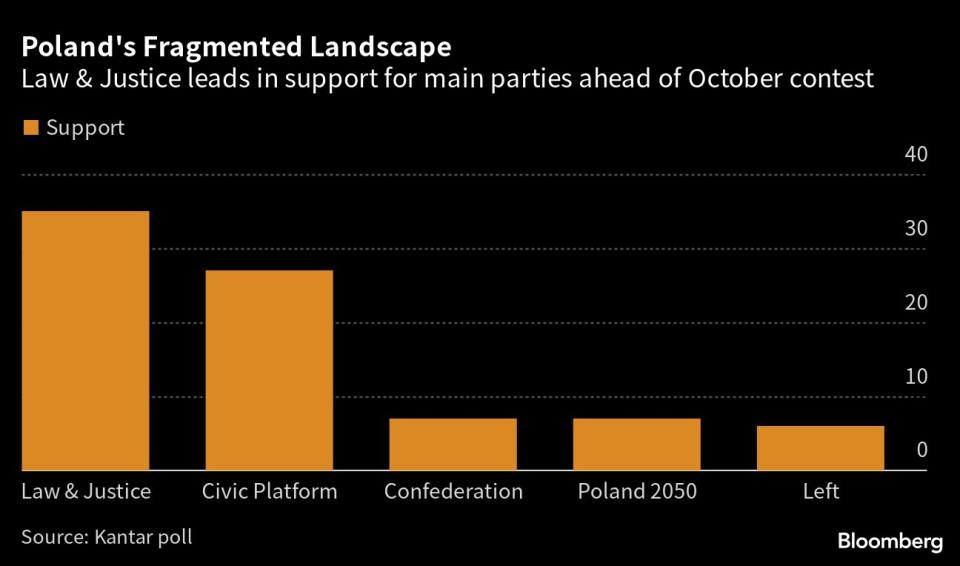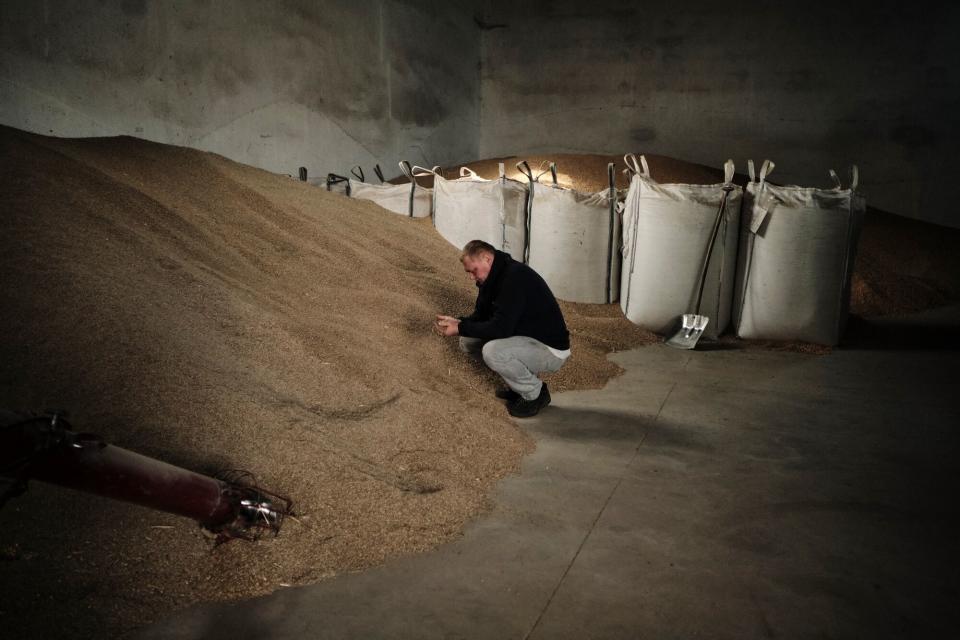Eastern Europe Is Jeopardizing an Economic Lifeline for Ukraine
(Bloomberg) -- A crucial economic lifeline for Ukraine is being jeopardized by eastern European governments contending with the limits of public support for Kyiv as the war stretches into its second year.
Most Read from Bloomberg
Nigeria Targeted a UK Mansion; Its Next Leader’s Son Now Owns It
Morgan Stanley Plans 3,000 More Job Cuts as Dealmaking Slumps
Wall Street Rattled by 15% Tumble in Pair of Banks: Markets Wrap
Nowhere is the shift more vivid than in Poland, a stalwart ally of Ukraine that has led the European Union in denouncing the Russian invasion. Warsaw issued a surprise ban on Ukrainian grain imports last month after weeks of street protests by Polish farmers over a grain glut that triggered a collapse in prices. Restrictions quickly followed in Hungary, Slovakia and Bulgaria.
Poland’s ban was meant to ensure that solidarity with Kyiv doesn’t alienate voters, according to an official familiar with the government’s thinking. It's a rare admission of mounting anxiety within the ruling Law & Justice party that it risks losing a key part of its base six months before a tightly contested election.
Even as Law & Justice has maintained a lead in polls ahead of the vote slated for October, a fragmented landscape could loosen the party’s grip on power. Long the bastion of Poland’s staunchly Catholic conservatives, its base in the countryside has been crucial to electoral success since the party swept to power in 2015. The prospect of leaving angry farmers in the lurch isn’t part of a winning agenda as officials swing into campaign mode.
Read More: The Pope Returns to Polish Politics From Beyond the Grave
One shift spurring action is the recent gain in opinion polls by a far-right, anti-European Union alliance, Confederation, which has channeled public wariness over an influx of Ukrainian refugees and unlimited military aid to Kyiv.
Law & Justice leader Jaroslaw Kaczynski — Poland’s de-facto leader — spelled out the anxiety even as he put a positive spin on the grain embargo, saying the “tough decision” would ultimately help Kyiv.
“It’s not in the interest of our friends that Poland is plunged into a crisis — and that we see people coming to power here who will change the policy of radical support for Ukraine,” Kaczynski told a crowd, some clad in traditional outfits in a school auditorium last month in the village of Lyse in northeastern Poland, about 150 kilometers (94 miles) north of Warsaw.
The European Union, which issued a rebuke for the move for potentially violating the bloc’s trade policy, has since forged an agreement with eastern members who imposed the ban, securing transit of goods to other member states. The deal, which Romania has joined, subjects the measures — now including wheat, corn, rapeseed, sunflower and sunflower oil — to a deadline in June, which can be extended until the end of the year. But the blockade remains in place.
Poland’s initial unilateral action came little more than a week after Ukrainian President Volodymyr Zelenskiy came to Warsaw on a state visit on April 5, a display of lockstep unity as Kyiv seeks ammunition and hardware. Poland’s president, Andrzej Duda, said in a speech that nothing would divide the two neighbors.
But the embargo puts Ukraine, which is already grappling with a shaky deal with Russia to allow shipments from Black Sea ports, in a bind — some 7% of its corn and wheat exports have gone to Poland this season.
Zelenskiy decried the restrictions during a phone call with European Council President Charles Michel and demanded their removal.
“The artificial and illegal restriction of trade with the European Union is hitting Ukraine, resisting Russian aggression, both economically and politically,” Zelenskiy said.
Meanwhile, Polish farmers continue to stage protests at border crossings, lashing out at the flood of Ukrainian grain pushing down prices. Robert Winnicki, one of Confederation’s leaders, has joined the protesters, pinning the blame on Law & Justice for allowing the tide of “low-quality” product.
“Polish farmers suffer because they cannot sell their grain,” Winnicki told reporters after he met with farmers gathered at the Ukrainian border at the village of Medyka in March. “Ukrainian grain is mixed with Polish and as such is then sold to shops, to factories, for consumption by Poles.”
Skepticism among the public is born out in some polls. About a quarter of people surveyed in a poll commissioned by newspaper Rzeczpospolita ahead of the first year mark of the war said their view of Ukrainian refugees had dimmed over the previous six months.
Law & Justice led the main opposition Civic Platform, headed by former European Council President Donald Tusk, 35% to 27%, according to an April 14-19 Kantar poll. Both parties gained 5 percentage points respectively. Confederation held steady at 7%, the poll showed, while some 15% were undecided.
Poland’s government had responded taken aim at a favorite enemy, the European Commission — with which it’s had a running conflict over rule-of-law standards — saying the EU’s executive has failed to assist farmers.
Tusk accused the administration of deflecting blame in the crisis.
“A year ago, we still had a serious chance to solve the problem of Ukrainian grain together with the EU in a way that would have helped Ukraine and not threaten Polish interests,” Tusk told a rally in Lipsko, eastern Poland, last month.
--With assistance from Aliaksandr Kudrytski.
Most Read from Bloomberg Businessweek
Women Chief US Economists Have Gotten Even Rarer on Wall Street
More Companies Head to Space, But No One Can Agree on the Rules Up There
At Charles Schwab, Being a Big Bank Has Become a Big Problem
©2023 Bloomberg L.P.

 Yahoo News
Yahoo News 


